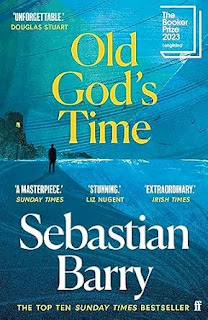Alex Dudok de Wit takes us through lots of animated features in Episode 51 Beyond Aardman. From Camberwick Green in 1966 to The Wombles, Postman Pat, Bagpuss and The Clangers. We get a potted history of stop motion and puppet animation. And right up to date we have Tim Burton and Wes Anderson joining the fray. I have put The Corpse Bride on my to see list.
What is Barbara Windsor doing with her arm on Sid James? They are Beside the Seaside in Episode 52 narrated by Pamela Hutchinson. There are lots to see, from the Carry On films through to 2012's terrific Byzantium. Brighton Rock from 1948, Whisky Galore (1949), A Matter of Life and Death three years earlier, Get Carter (just the ending gets it to this list), Quadrophenia from 1979 of course, ("When Churchill talked about fighting on the beaches he didn't imagine the mods and rockers"), The French Lieutenant's Woman (1981), Local Hero (1983), Never Let Me Go (2010), and Ammonite in 2020. Jumping back to 1938, we see Carol Reed's 1938 drama Bank Holiday. But it had to end in the waves on the beach in Park Chan-wook's Decision to Leave.
Episode 53 is all about the great British night out in Rave Britannia by Ellen E Jones. The above photo is of very young John Simm and Danny Dyer in 1999's Human Traffic. Pub crawls and bowling, have we not done it all? We start down the pub in 1960's Saturday Night and Sunday Morning. Ad then a wild change of direction to all those dance floor movies. It obviously could not ignore 24 Hour Party People, but the newer rave films passed me by.
Here is Cher in Episode 54 ..... The Cher Factor by Anna Bogutskaya. So not only is she a singer but "a talented actor". Hmmm. Well there is a long history of pop singers making it onto the big screen. (Maybe an episode about them would be better?) But here we start with Come Back to the Five and Dime, Jimmy Dean, Jimmy Dean. Then the superior Silkwood with Meryl Streep, and more.
Hanna Flint narrates Episode 55 Strong Female Characters of which there are many. "In each new wave of feminism, we find empowerment in a male dominated world". We see clips from so many action films from Linda Hamilton in the Terminator films, Sigourney Weaver in the Alien franchise and Margot Robbie as Harley Quinn in 2020's Birds of Prey. And many more.
Could I please pass on Episode 56 Fat Females on Film with Grace Barber-Plentie.
But Episode 57 Nuns on Film by Pamela Hutchinson is brilliant. I thought we were running out of themes, but no. So 1947's Powell and Pressburger classic Black Narcissus is a must see. Convents seem to be great locations. From 1985's Agnes of God to Doubt from 2008 and 2013's Philomena. These are all great dramas. Shame about the more recent horror films.
Talking about horror, episode 58 is The Jump Scare with Mike Munger. Did I really want to watch this? But when I saw Gromit in an early clip, I thought it might be OK. From 1925's The Phantom of the Opera when he has his mask removed to more recent scares in The Shining, Psycho, Jurassic Park and Jaws. Well those were OK. But the more modern horrors I could do without, now just a cheap, lazy trick.
Episode 59 is Queer Villains. It's Casper Salmon who shows us far too much of Divine. However, Hitchcock's Rope looks interesting. I didn't realise how many Bond villains were gay. That's Javier Barden above teasing James in 2012's Skyfall.
Last of these ten is episode 60 Jukebox Musicals with Dewi Evans. Extended highlights of Moulin Rouge along with Mama Mia, Sunshine on Leith (Hurrah!), and Rocketman. All before we track back to 1952's Singing on the Rain. Just to compare one song with that in 1939's Babes in Arms. "Good Morning" is sung in that film by Judy Garland and Mickey Rooney. A longer version (in colour) is on YouTube.

















































